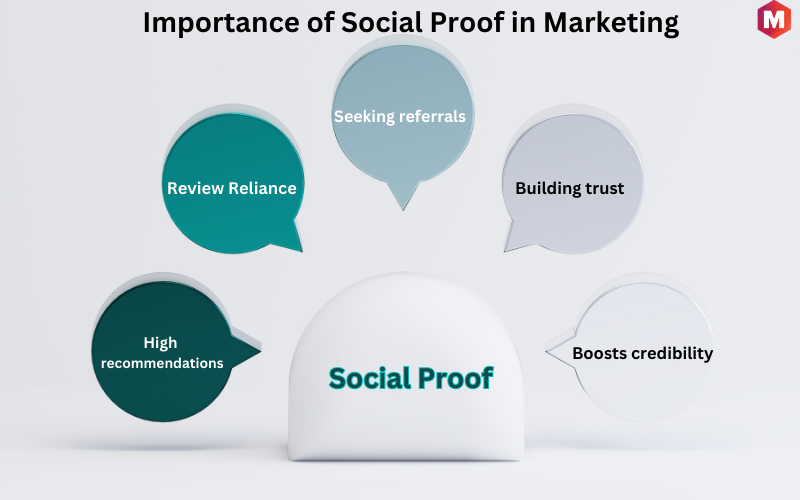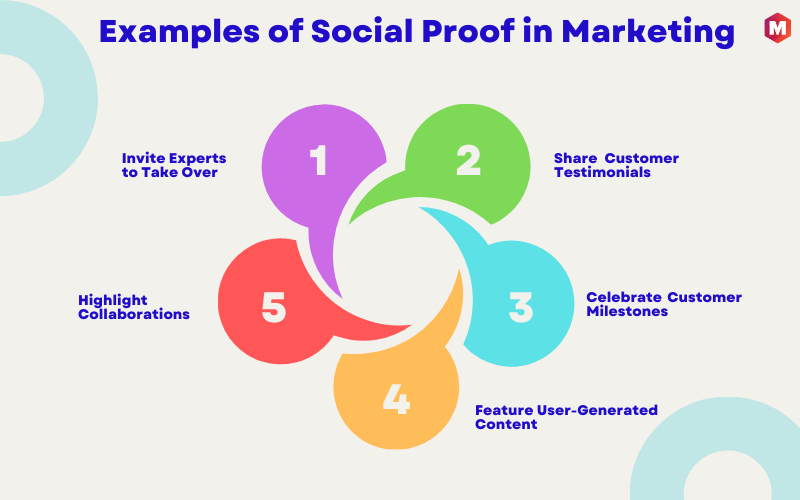Social proof in Marketing is when people copy actions of others and behave accordingly. This may happen because you assume that others know better, especially when you are uncertain. For example, if I notice a long line outside a restaurant, I might assume the food is good and choose to eat there.
- Origin of Social Proof Concept: Introduced by Robert Cialdini in “Influence: Science and Practice” (1984).
- Social Proof Examples in Digital Marketing: Product reviews, testimonials, and online recommendations. You can use them to influence consumer behavior by building trust.
Table of Contents
Importance of Social Proof in Marketing
Social proof is important in marketing because it influences consumer behavior and builds trust. People trust and follow the actions of others. This is especially true when making purchasing decisions. Using social proof in your business model can boost credibility and drive sales.
- High recommendations: 83% of consumers recommend brands to friends and family who follow them on social media. This type of word of mouth marketing is powerful and cost-effective.
- Review Reliance: 95% of consumers read online reviews before buying. Surveys provide reassurance and help consumers make informed decisions.
- Seeking referrals: 82% of Americans seek referrals and recommendations from family and friends before making any purchase. Personal recommendations are more reliable.
- Building trust: Life proofs such as testimonials and reviews build trust among potential customers. Trust is essential to converting prospects into customers.
- Boosts credibility: Displaying social proof on your website or marketing materials enhances your brand’s credibility. It means that others have had a positive experience with your product or service.
9 Types of Social Proof in Marketing
| Types | How It Works | |
|---|---|---|
| 1 | Case studies | Writing case studies about satisfied customers showcases their positive experiences. Identify successful clients and ask if they’d participate in a case study. These deep dives highlight how you and the customer worked well together. Use downloadable PDFs or host them on your blog to share the stories. A dedicated page for customer stories can effectively display case studies. |
| 2 | Testimonials and reviews | Share online testimonials and reviews on social media to let your audience know what others think. Reviews are a strong example of social proof. Including ratings and reviews on your website and social media can draw potential customers in. Tools like Sprout can help manage reviews and show you care about customer experiences. It boosts engagement and improves your online presence. |
| 3 | Existing customers and clients | Publicly sharing information about well-known brands you work with can attract interest. If big brands like Google trust your business, it shows you do good work. Display logos of recognized clients on your homepage. Highlighting well-known customers builds credibility and trust. It can make potential customers more interested in your services. |
| 4 | Awards and accolades | Show off awards and top rankings to highlight your business's excellence. Display badges or images of awards on your website footer or homepage. It lets people know your business is recognized for its quality. Successful brands display awards on their homepage to showcase their achievements. This form of social proof can enhance your brand’s reputation. |
| 5 | User-generated content (UGC) | Share user-generated content on social media to show you have happy customers. Instagram is great for this; create a branded hashtag and encourage users to share. Feature their posts on your account and tag the original posters. Aerie uses this strategy effectively to showcase customer satisfaction. UGC works well on various platforms but is most effective on Instagram. |
| 6 | Influencer marketing | Compensate influencers to showcase your brand in their content. People follow influencers to see what products and services they use. This type of marketing exposes your brand to a wider audience. Karan Johar’s collaboration with LensKart is a good example. Influencer marketing is a strong form of social proof. |
| 7 | Integrations | Highlight integrations with other popular software to show your product’s compatibility. SaaS tools often use this to demonstrate robustness and trust. Calendly’s integration with Slack is a good example. Knowing that your software works well with others can be a great selling point. This form of social proof reassures potential customers about your product’s value. |
| 8 | Customer love | Share customer praises and kind words on social media. It can be in the form of reviews or simple mentions. Notion retweets positive feedback to showcase genuine customer satisfaction. Social listening tools can help you track mentions and feedback. Sharing customer love is an effective way to build trust and loyalty. |
| 9 | Customer base | Showcase the number of customers, products sold, or users you have to prove your business’s experience. Mentioning these numbers can show that many people trust your service. Udemy’s Twitter bio displays that they’ve helped millions of students. Teachable shares that they’ve hosted over 100,000 creators, generating significant revenue. This form of social proof demonstrates your business’s success and reliability. |
Examples of Social Proof in Marketing
| Examples | Explanation | Lessons to Learn |
|---|---|---|
| Invite Experts to Take Over | Experts take over your social media to post content and engage with followers. Example: A publishing house can invite a well-known writer for a podcast session on Instagram Live. It boosts credibility and leverages the expert's influence. | ?Gain new followers from the expert’s audience. ?Boost your brand’s credibility. ?Engage your audience with fresh content. ?Enhance your brand’s visibility. |
| Share Customer Testimonials | Display testimonials and reviews on your website and social media. Example: A tech company can share a customer's positive review about their latest gadget on Twitter. It builds trust and influences potential buyers. | ?Build trust with potential customers. ?Showcase real-life success stories. ?Highlight the benefits of your product. ?Encourage others to share positive experiences. |
| Celebrate Customer Milestones | Share milestones like the number of users or followers. Example: A fitness app can celebrate reaching 1 million users with a special post. It shows your brand is trusted to and highlights growth. | ?Show appreciation to your customers. ?Highlight your brand’s growth. ?Build a sense of community. ?Encourage new customers to join. |
| Feature User-Generated Content | Encourage customers to create content featuring your products. Example: A fashion brand can repost customers’ photos wearing their clothing on Instagram. It shows real-world applications and boosts engagement. | ?Showcase the real-world use of your products. ?Engage your audience with authentic content. ?Build a community around your brand. ?Increase brand loyalty. |
| Highlight Collaborations | Publicize partnerships with well-known brands or influencers. Example: A skincare company can collaborate with a famous beauty influencer to review their products. It implies quality and increases visibility. | ?Attract followers from the collaborator’s audience. ?Boost your brand’s credibility. ?Leverage the collaborator’s influence. ?Increase your brand’s visibility. |
Conclusion!
Social proof is a marketing tool that influences consumer behavior and builds trust. Use social proof in your marketing strategy to boost credibility and drive sales. Key benefits covered in this article are:
- Builds Trust: Testimonials and reviews show your brand is reliable.
- Enhances Credibility: Awards and recognitions highlight your excellence.
- Increases Engagement: User-generated content and influencer collaborations boost interaction.
- Shows Growth: Sharing milestones demonstrates your brand’s success.
- Attracts New Customers: Publicizing collaborations and customer numbers draws new clients.
Liked this post? Check out the complete series on Marketing

